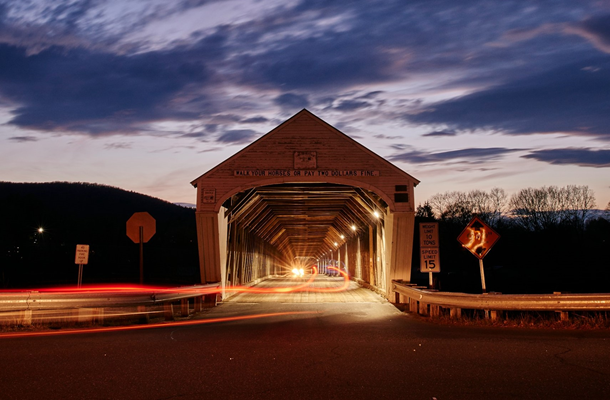There are only 60 covered bridges left in the State of New Hampshire. I can’t say how many we used to have or what happened to them, but someone has proposed creating a loophole in the state’s existing prohibitions against video surveillance. Why? ”
Covered bridges are essential to [insert name of town(s)] history, identity, and sense of community.”
These landmarks attract tourists; if you don’t mind, it can benefit the local economy. But damage and vandalism result in significant costs, so I get why there would be some interest in using cameras to watch these precious things, and the proposed legislation to allow surveillance includes some restrictions.
Under Faulkner’s bill, such video monitoring could be used only to investigate damage to a covered bridge. All other unrelated footage would be erased after seven days. Faulkner said the legislation is “carefully crafted to respect privacy rights of those who drive through the bridge.”
On Feb. 2, an amended version of HB 1217 received unanimous bipartisan support from the House Criminal Justice and Public Safety Committee. As amended, the bill would also require the state to install signs 100 feet away from the covered bridges alerting drivers that they are subject to video surveillance – just as businesses are required to do.
The bill has broad support, coming out of committee with a unanimous recommendation to support it (Ougth to pass 18-0), and I doubt there is much that will stop it from getting to the governor and becoming law, but I have concerns. New Hampshire’s long-held commitment to prohibiting public surveillance has been eroding, and every piece of new legislation opens the door a bit wider. With a legislative wink and a tweak, almost everything can be labeled as “important to [insert name’s] history, identity, and sense of community.”
Well-intentioned, HB1217 will invite, if not new, clauses (exceptions, provisos, caveats) that expand the times and locations where surveillance is permitted and on increasingly broader terms.
I like Covered Bridges. There’s one less than two miles from where I type this. But I think I’d rather add a line item to the local budget for more insurance to repair or replace them than open the door further to a surveillance state we know cannot be trusted and a government that increasingly works harder to deny natural rights than to protect them.
We do, after all, as a state and a nation, have a history of protecting rights and some measure of privacy, and while spying on bridges sounds harmless or even necessary (they are just like traffic cameras, Steve – to which I also object, btw), abuse and mission creep are inevitable. Once you open the door, it is almost impossible to get it closed.
